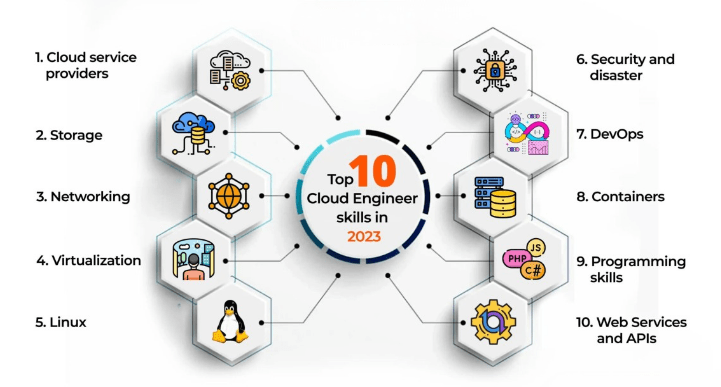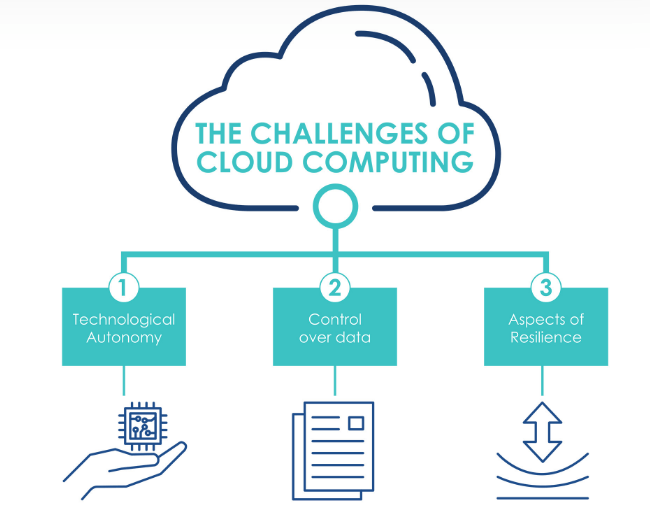
- Introduction to Cloud Engineering
- What is a Cloud Engineer?
- Key Roles and Responsibilities of a Cloud Engineer
- Skills Required for Cloud Engineering
- Types of Cloud Engineers
- Cloud Engineering vs. Traditional IT Roles
- Challenges Faced by Cloud Engineers
- How to Become a Cloud Engineer: Pathways and Certifications
- Conclusion
Introduction to Cloud Engineering
Cloud computing has fundamentally changed the way businesses operate by offering scalable, flexible, and cost-effective IT resources over the internet. With the rapid growth of cloud services like Amazon Web Services (AWS), Microsoft Azure, and Google Cloud Platform (GCP), there is an increasing demand for professionals who specialize in managing and optimizing cloud environments. This demand has led to the rise of cloud engineers experts responsible for the design, implementation, and maintenance of cloud infrastructure. Cloud engineering is an exciting and rewarding field that combines skills in software development, system administration, and network engineering to support cloud-based operations. A Cloud Computing Course can provide the essential knowledge and hands-on experience needed to excel in this dynamic field. As more organizations move their data, applications, and services to the cloud, cloud engineers play a pivotal role in ensuring the reliability, security, and scalability of cloud environments.
Interested in Obtaining Your Cloud Computing Certificate? View The Cloud Computing Online Course Offered By ACTE Right Now!
What is a Cloud Engineer?
A cloud engineer is an IT professional responsible for managing, optimizing, and maintaining cloud infrastructure and services. They work with cloud providers like AWS, Microsoft Azure, or Google Cloud to build and deploy cloud-based solutions for businesses. The role involves designing cloud architecture, setting up virtual machines, managing databases, and ensuring that the systems are highly available, secure, and perform well. Additionally, professionals can Automate Security with DevSecOps Approach to integrate security into every stage of the development and deployment process.

Cloud engineers work closely with various teams, such as developers, system administrators, and security professionals, to design and implement a cloud strategy that aligns with business objectives. They ensure that cloud infrastructure is scalable, secure, and reliable while meeting performance requirements. Additionally, cloud engineers are responsible for the efficient operation of cloud resources, which includes monitoring performance, managing costs, and optimizing resource usage. By focusing on cost management and performance tuning, they help organizations maximize the value of their cloud investments, ensuring that cloud solutions are both effective and cost-efficient in supporting business goals.
Key Roles and Responsibilities of a Cloud Engineer
Cloud engineers have a wide range of responsibilities depending on the organization’s needs and the specific cloud services being used. Below are some of the key roles and duties they perform:
Cloud Architecture Design
Cloud engineers are responsible for designing cloud-based architectures that support the company’s infrastructure needs. This involves selecting the appropriate cloud services, ensuring scalability, fault tolerance, and high availability. They choose between public, private, or hybrid cloud models and ensure that the architecture is optimized for cost and performance.
Infrastructure Management
Managing the cloud infrastructure is a core responsibility. Cloud engineers provision and configure resources like virtual machines (VMs), storage, and networks in the cloud environment. They also handle provisioning automated scaling, load balancing, and monitoring.
Cloud Security
Ensuring the security of cloud environments is paramount. Cloud engineers implement security best practices such as identity and access management (IAM), encryption, and firewalls. They also recognize the Importance of Cloud Backup to protect critical data and ensure business continuity in case of unexpected events.
Deployment and Automation
Cloud engineers are responsible for setting up continuous integration and continuous delivery (CI/CD) pipelines, which automate the process of deploying software updates to the cloud. They may also implement infrastructure as code (IaC) to automate the provisioning and management of cloud resources using tools like Terraform, CloudFormation, or Ansible.
Cloud Monitoring and Optimization
Once cloud infrastructure is set up, cloud engineers continuously monitor performance, availability, and resource usage. They use monitoring tools like AWS CloudWatch, Azure Monitor, or Google Stackdriver to ensure the infrastructure runs smoothly. Cloud engineers also work to optimize cloud resource usage, reduce costs, and improve performance.
Backup and Disaster Recovery
Cloud engineers are responsible for creating and managing backup strategies to ensure data availability in case of failure. They design disaster recovery plans and ensure that there are mechanisms in place to quickly restore operations following an unexpected event.
Troubleshooting and Support
When issues arise, cloud engineers diagnose and resolve problems with the cloud infrastructure. Whether it’s a server going down, a performance bottleneck, or an outage, cloud engineers work to identify the root cause and implement solutions.
Are You Interested in Learning More About Cloud Computing? Sign Up For Our Cloud Computing Online Course Today!
Skills Required for Cloud Engineering
To excel as a cloud engineer, professionals must develop a blend of technical and soft skills. A deep understanding of cloud platforms such as AWS, Microsoft Azure, or Google Cloud is essential, as cloud engineers need to be proficient in managing services like compute instances, storage, networking, databases, and security tools. Programming and scripting skills are also critical, as these allow cloud engineers to automate tasks and efficiently manage cloud resources. Familiarity with languages like Python, Java, Bash, or PowerShell is highly valuable. Additionally, cloud engineers must have a solid grasp of networking concepts, including virtual private networks (VPNs), subnets, load balancers, DNS, and firewalls, all of which are integral to cloud infrastructure. An Overview of Service Mesh is also important, as it helps manage microservices communication, providing visibility, security, and scalability in cloud environments. Security is another key area; cloud engineers should be well-versed in best practices like identity and access management (IAM), encryption, multi-factor authentication (MFA), and network security protocols. They must also be familiar with DevOps practices and tools such as Jenkins, Docker, Kubernetes, and Terraform. Finally, strong problem-solving and analytical skills are crucial for troubleshooting and optimizing cloud systems.
Types of Cloud Engineers
There are several different specializations within cloud engineering, each with distinct responsibilities and focus areas:
Cloud Solutions Architect
A cloud solutions architect is responsible for designing and implementing cloud-based systems and services for organizations. They ensure that the architecture is aligned with business goals and is scalable, secure, and cost-effective.
Cloud DevOps Engineer
A cloud DevOps engineer focuses on automating the processes of deployment, scaling, and infrastructure management in the cloud. A Cloud Computing Course can help develop the necessary skills to efficiently manage and optimize cloud environments. They work closely with development teams to create seamless CI/CD pipelines, leveraging cloud tools to speed up software releases.
Cloud Security Engineer
A cloud security engineer specializes in securing cloud environments and ensuring compliance with security policies. They manage identity and access management (IAM), encryption, firewalls, and other security measures to protect data and applications in the cloud.
Cloud Network Engineer
A cloud network engineer manages the networking aspects of cloud infrastructure, including setting up virtual private clouds (VPCs), configuring subnets, and optimizing network performance and connectivity in cloud environments.
Gain Your Master’s Certification in Cloud Computing by Enrolling in Our Cloud Computing Masters Course.
Cloud Engineering vs. Traditional IT Roles
While both cloud engineers and traditional IT professionals focus on managing infrastructure, cloud engineers specifically work with cloud services and architecture. Here are some key differences:
| Aspect | Cloud Engineer | Traditional IT Engineer |
|---|---|---|
| Infrastructure | Manages cloud resources, virtualized environments | Manages physical hardware and on-premise infrastructure |
| Tools and Technologies | AWS, Azure, Google Cloud, Terraform, Docker | Cisco, VMware, Windows Server, etc. |
| Scalability | Designs scalable, elastic environments | Limited scalability, hardware-dependent |
| Cost Management | Optimizes cloud resources for cost efficiency | Focuses on managing physical hardware costs |
| Automation | Automates cloud provisioning and management using code | Relies on manual configuration and deployment |
Challenges Faced by Cloud Engineers
Cloud engineering can be highly rewarding, but it also comes with its challenges. Some of the common challenges include:
- Managing Complex Architectures: As cloud environments grow more complex, managing the infrastructure can become increasingly difficult. A Google Cloud Engineer plays a crucial role in navigating and optimizing these environments, ensuring efficiency, scalability, and security in cloud operations. Cloud engineers need to ensure that the system remains efficient and cost-effective as it scales.
- Security Concerns: With more data and applications moving to the cloud, ensuring security is a constant challenge. Cloud engineers must stay updated on the latest security threats and implement robust defenses.
- Cost Management: Cloud services follow a pay-as-you-go pricing model, which means cloud engineers need to monitor and optimize usage to avoid unnecessary costs.
- Keeping Up with New Technologies: Cloud services evolve rapidly, and cloud engineers must stay current with new features, tools, and best practices to remain effective.

How to Become a Cloud Engineer: Pathways and Certifications
Becoming a cloud engineer typically involves several key steps that help individuals build the necessary skills and expertise for the role. The first step is having an educational background in computer science, information technology, or a related field. Most cloud engineers hold a degree in one of these areas, which provides a solid foundation in programming, networking, and systems administration. However, some may also come from self-taught backgrounds or have completed specialized vocational training programs focused on cloud computing and IT infrastructure. Next, gaining experience in traditional IT roles is crucial for cloud engineers. Starting out in positions like system administration, network engineering, or software development provides hands-on experience with the technologies that underpin cloud systems. This foundational knowledge is important before transitioning to the cloud. Obtaining certifications is a key step in becoming a cloud engineer, and understanding Containerization in Cloud Computing is essential, as it allows for more efficient and scalable deployment of applications in cloud environments. Certifications help validate technical skills and demonstrate expertise to potential employers. Popular cloud certifications include the AWS Certified Solutions Architect – Associate, Microsoft Certified Azure Solutions Architect Expert, and the Google Professional Cloud Architect. These certifications focus on specific platforms and key cloud engineering skills such as cloud architecture, security, and resource management. Finally, it is important for cloud engineers to stay updated with the rapidly evolving field of cloud computing. Participating in online communities, attending cloud conferences and events, reading industry blogs, and taking part in webinars can help engineers keep pace with new trends and technologies. Continuous learning and adapting to the latest advancements are essential for success in this dynamic and fast-growing field.
Are You Preparing for Cloud Computing Jobs? Check Out ACTE’s Cloud Computing Interview Questions & Answer to Boost Your Preparation!
Conclusion
Cloud engineers play a pivotal role in the success of modern organizations by designing, implementing, and optimizing cloud infrastructure. As businesses increasingly rely on cloud computing for scalability, flexibility, and cost-efficiency, cloud engineers ensure that the underlying cloud systems are robust, secure, and capable of meeting business demands. Their expertise in cloud platforms like AWS, Azure, and Google Cloud enables organizations to seamlessly migrate, manage, and scale their applications in the cloud. With the rapid adoption of cloud technologies across industries, the demand for skilled cloud engineers has soared. Taking a Cloud Computing Course can help professionals gain the expertise needed to meet this growing demand. This growing need presents exciting opportunities for those entering the field or looking to advance their careers. Cloud engineers are responsible for a range of tasks, from setting up cloud infrastructure to monitoring system performance and ensuring security compliance. Their work helps organizations innovate, improve operational efficiency, and stay competitive in a digital-first world. Whether you’re starting your journey in cloud computing or aiming to take your career to the next level, becoming a cloud engineer offers a promising and rewarding career path in the ever-evolving tech landscape.





